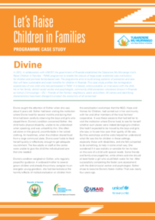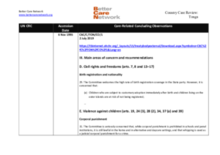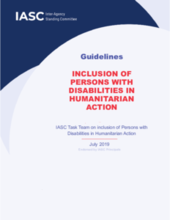Displaying 171 - 180 of 494
In this video, Children in Families ABLE project practitioners discuss their key learning with respect to supporting caregivers to care for children, including the importance of managing stress and expectations, developing trusting relationships and taking a whole family approach to support.
This video shares insights from the Angkor Hospital for Children social work unit’s key learning around what leads to abandonment, how to work with families to identify and solve underlying issues, how to engage and communicate with families and how to identify risk indicators for abandonment.
This video shares insights from Angkor Hospital for Children on how to conduct family tracing in the event abandonment has already occurred, including identifying leads and key sources of information.
In this video, Children in Families ABLE project practitioners speak to their experience and learning around recruiting foster families to care for children with disabilities, including the types of families to target and how to use role-modeling to address issues of stigma in the community.
Comprised of 12 videos and accompanying discussion guides, this video series features the learning from practitioners working across a range of care-related programs and practices in Cambodia.
In this article, institutions in Russia, China, Ghana, and Chile are described with reference to the circumstances that lead to children’s institutionalization, resident children’s social-emotional relationships, and unique characteristics of each country’s institutional care (e.g., volunteer tourism in Ghana, and shifting demographics of institutionalized children in China).
This case study profiles the reintegration experiences of one child who has participated in the Tubarerere Mu Muryango (Let’s Raise Children in Families - TMM) programme in Rwanda.
This study aims to explore the experiences of carers of children with cerebral palsy living in rural areas of Ghana who have received no rehabilitation services.
This country care review includes the care-related Concluding Observations adopted by the Committee on the Rights of the Child.
The guidelines set out essential actions that humanitarian actors must take in order to effectively identify and respond to the needs and rights of persons with disabilities who are most at risk of being left behind in humanitarian settings.



